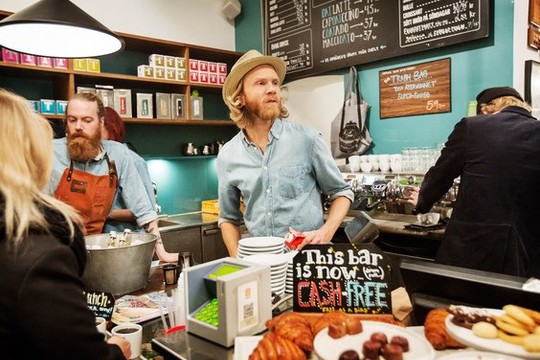A cafe in Stockhlom that is completely cash-free
Photo: The New York Times
The financial authorities, who once embraced the trend, are asking banks to keep peddling notes and coins until the government can figure out what going cash-free means for young and old consumers. The central bank, which predicts cash may fade from Sweden, is testing a digital currency — an e-krona — to keep firm control of the money supply. Lawmakers are exploring the fate of online payments and bank accounts if an electrical grid fails or servers are thwarted by power failures, hackers or even war, writes ‘The Financial Post’ from Canada.
“When you are where we are, it would be wrong to sit back with our arms crossed, doing nothing, and then just take note of the fact that cash has disappeared,” said Stefan Ingves, governor of Sweden’s central bank, known as the Riksbank. “You can’t turn back time, but you do have to find a way to deal with change.”
Ask most people in Sweden how often they pay with cash and the answer is “almost never.” A fifth of Swedes, in a country of 10 million people, do not use automated teller machines anymore. More than 4,000 Swedes have implanted microchips in their hands, allowing them to pay for rail travel and food, or enter keyless offices, with a wave. Restaurants, buses, parking lots and even pay toilets depend on clicks rather than cash.
Consumer groups say the shift leaves many retirees — a third of all Swedes are 55 or older — as well as some immigrants and people with disabilities at a disadvantage. They cannot easily gain access to electronic means for some goods and transactions, and rely on banks and their customer service. And the progress toward a cashless society could upend the state’s centuries-old role as sovereign guarantor. If cash disappears, commercial banks would wield greater control.
“We need to pause and think about whether this is good or bad, and not just sit back and let it happen,” said Mats Dillén, the head of a Swedish Parliament committee studying the matter. “If cash disappears, that would be a big change, with major implications for society and the economy.”
Urban consumers worldwide are increasingly paying with apps and plastic. In China and in other Asian countries rife with young smartphone users, mobile payments are routine. In Europe, about one in five people say they rarely carry money. In Belgium, Denmark and Norway, debit and credit card use has hit record highs.
But Sweden — and particularly its young people — is at the vanguard. Bills and coins represent just 1 per cent of the economy, compared with 10 per cent in Europe and 8 per cent in the United States. About one in 10 consumers paid for something in cash this year, down from 40 per cent in 2010. Most merchants in Sweden still accept notes and coins, but their ranks are thinning.
Among 18-to-24-year-olds, the numbers are startling: Up to 95 per cent of their purchases are with a debit card or a smartphone app called Swish, a payment system set up by Sweden’s biggest banks.
The central bank has plans to roll out a pilot version next year of a new type of Riksbank money — the digital krona, or e-krona — that could replace physical cash or at least help calm the current cash conundrum. An e-krona would mean that the functions of a currency backed by the state would remain, even in an all-digital world that is fast approaching.
Christine Lagarde, managing director of the International Monetary Fund, noted last week that several central banks were “seriously considering” digital currencies.
read more in our Telegram-channel https://t.me/The_International_Affairs

 8:58 10.01.2024 •
8:58 10.01.2024 •























